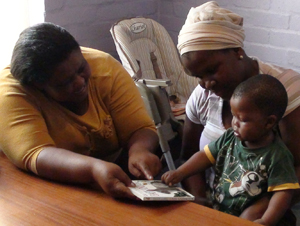Book sharing could be life-changing for world's poorest children
Release Date 16 December 2014

Book sharing could transform the lives of children living in the poorest parts of the world, the findings of a new University of Reading study suggest.
The researchers found that training mothers in a poor South African community to share picture books with their infants dramatically improved their infant's cognitive development.
By employing simple techniques, such as following the child's interest, pointing and naming things on the page, and elaborating on content, mothers significantly improved their infants' vocabulary and comprehension.
Notably, the attention span of the children whose mothers had received the training almost doubled. Since early attention is a strong predictor of later intellectual performance, training mothers in good book-sharing techniques could be of benefit to children when they go to school, thereby enhancing their career prospects.
Illiteracy is a global concern that affects a child's health and future prospects. Research¹ by UNESCO suggests that 175 million young people, largely from low and middle income countries, lack basic literacy skills.
A World Literacy Foundation study² estimated that illiteracy costs the global economy more than $1 trillion a year through lost job opportunities and the costs of unemployment and ill health.
This study was conducted in Khayelitsha on the outskirts of Cape Town. Working in partnership with Stellenbosch University in South Africa, the researchers recruited mothers with 14 to 16 month old infants. The mothers then received weekly training sessions on book-sharing over two months.
Professor Peter Cooper, who co-directed the study with Professor Lynne Murray, both from the University of Reading's School of Psychology and Clinical Language Sciences, said: "There is a wealth of evidence from high income countries of the benefits to children of early book-sharing. However there has been surprisingly little research on the role book-sharing could play in low and middle income countries.
"Our study, the first of its kind in a low income country, demonstrates that it is possible to introduce sensitive book-sharing into contexts where this activity is unknown, and that doing so markedly improves child language and attention. Effective early book sharing could play a major role in boosting the educational prospects of children around the world."
Professor Murray highlighted an additional benefit of the book-sharing training programme: "It is notable that the skills the mothers gained from the book-sharing training transferred to the wider mother-infant relationship, with mothers becoming more sensitive and reciprocal with their infants in free play situations. This enhancement of sensitive parenting could be of real benefit to child social and emotional development."
The research does not stop at Khayelitsha. The team have recently trained a group of community workers in the Cameroon upon request of the World Health Organisation and are also in negotiations to train community workers in other parts of Africa.
The impact of dialogic book-sharing training on infant language and attention: a randomized controlled trial in a deprived South African community was published in the Journal of Child Psychology and Psychiatry
ENDS
Notes to editors:
According to Unesco figures for 2010, South Africa spends around one fifth of its entire state budget on education - a much larger proportion than in many comparable countries - but only around one per cent of that goes on preschool education. This compares to more developed countries, such as the UK, where six per cent of education spending is at that level, or Denmark, which spends 11% of its education budget among preschool-aged children.
²http://www.worldliteracyfoundation.org/The_Economic_&_Social_Cost_of_Illiteracy.pdf
About the University of Reading:
The University of Reading is ranked among the best 1% of universities in the world (THE World University Rankings 2011-12) is one of the top 20 universities in the UK in terms of research funding.
The School of Psychology and Clinical Language Sciences has a long-standing reputation for excellence in experimental psychology, perception, learning, memory and skilled performance. In recent years, research has strengthened in the field of developmental psychology, neuroscience, ageing, virtual reality and multimedia interactions.
